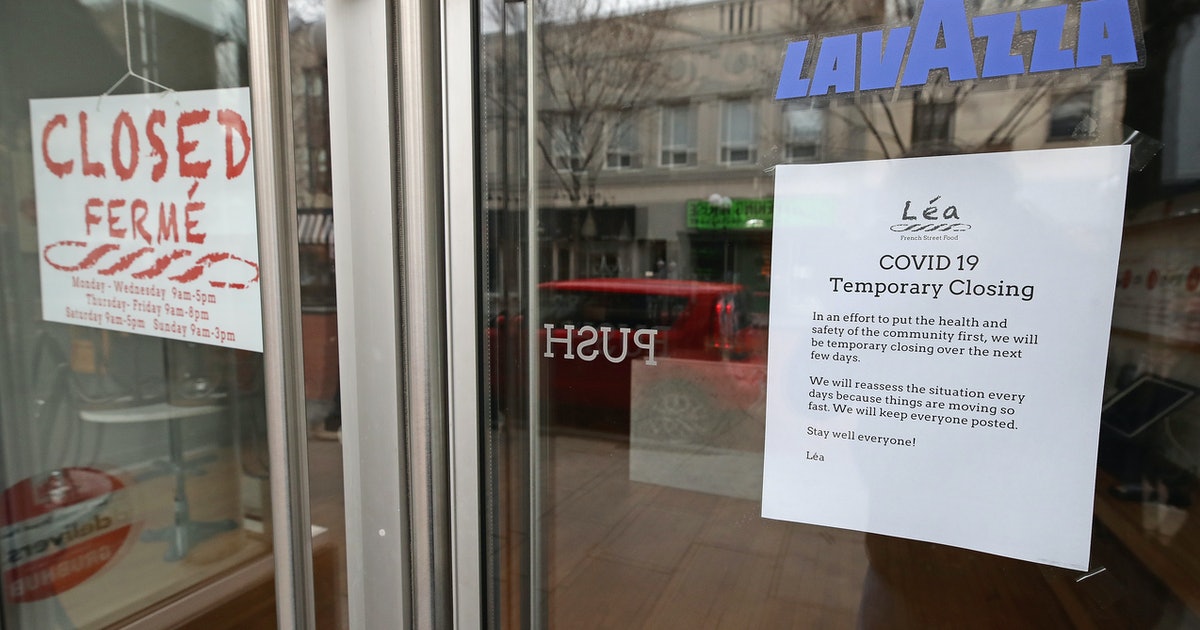You Can Help Shift & Gig Workers Affected By The Coronavirus Pandemic
Jonathan Daniel/Getty Images News/Getty Images
Here’s How To Help Laid-Off Shift & Gig Workers During The Coronavirus Pandemic
With more than 49,000 confirmed cases of the novel coronavirus, also referred to as COVID-19, across the United States as of March 24, more cities and states are taking measures to contain the spread of the virus. More than two dozen states have closed bars and restaurants to dine-in customers, and a wide range of retail stores have temporarily closed their doors as well. But because of all these closures, many people are losing their jobs and are struggling to pay their bills. If you are still able to work and want to help your community, here’s how to help laid-off shift workers during the coronavirus pandemic, because they are among the most vulnerable during this crisis.
According to , the coronavirus pandemic is disproportionately affecting those who are most marginalized, including low-income workers and people experiencing homelessness. Not everybody can work from home during a pandemic — and especially not those who work in the restaurant industry, retail, theater, or other industries that rely on in-person labor. More than a million American workers will likely lose their jobs by the end of March, per , as large and small businesses alike continue to let employees go. If you are looking to support workers and businesses in your community and around the country, here are a few things you can do to help.
Donate To Funds For Workers In Your City
Although there are a variety of national relief funds for laid-off and at-risk workers, the first thing you can do is check up on your favorite restaurant or local business. Many local businesses across the country have created GoFundMe pages to support employees laid off because of mandated closures, and you can be sure your money is going toward supporting a small business in your community. You can give them a call or find them on social media to see if they have any relief efforts in place. And if your favorite restaurant is offering food delivery or pickup, you can continue to order food from them — and tip generously.
Remember, too, it’s not just restaurants and bars that are struggling. Book stores, hair salons, clothing boutiques, and other small businesses have also closed their doors due to the pandemic. To help keep your favorite local businesses afloat, you can buy gift cards for later use, pay for existing appointments even if you can’t go to them, and purchase products online.
Support Local Artists
Actors, dancers, filmmakers, musicians, and other artists often live paycheck-to-paycheck to produce the work you love, but they may not be able to continue doing this work if their studios and creative spaces are closed down. Organizations and local artists in cities like Chicago, New York City, Boston, and Saint Paul have established relief funds for local artists. You can use Google or social media to find out whether there’s a relief fund for artists in your city — and if there isn’t one, you can collaborate with people in your community to set up a relief effort. You can also check in with local artists to see if they are taking commissions or donations.
Contribute To Nationwide Fundraisers For Shift Workers
There are also plenty of funds across the country that are supporting hourly workers in restaurants, bars, and other small businesses. You can consider donating to:
- Southern Smoke Foundation: Originally founded to help Houston workers in times of crisis, Chef Chris Shepherd’s Southern Smoke Emergency Relief Fund is now also helping out-of-state workers in the restaurant and bar industry who apply for assistance. You can donate to the Southern Smoke Emergency Relief Fund at this link.
- World Central Kitchen: Chef José Andrés announced on March 15 he was closing his New York and Washington, D.C. restaurants to repurpose them into community kitchens, where he will serve limited menus with flexible prices for those who can’t afford to pay. According to , this effort is part of Andrés’ World Central Kitchen, which distributes meals to people in need around the world after a disaster. You can donate to the World Central Kitchen at this link.
- One Fair Wage: OFW is a nonprofit and campaign that advocates for restaurant workers to be paid a full minimum wage by their employers, as opposed to the tipped minimum wage, which can be as little as $2.13 an hour. In light of the coronavirus pandemic, OFW is taking donations to provide “cash assistance to restaurant workers, car service drivers, delivery workers, personal service workers and more,” according to the nonprofit’s website. You can donate to OFW’s emergency fund for tipped and service workers at this link.
- UNITE HERE: UNITE HERE is a labor union representing workers in the United States and Canada, across industries including hotels, food service, transportation, manufacturing, and more. UNITE HERE is now taking donations to support its members with rent, groceries, health care, and other bills. You can donate to UNITE HERE’s support fund at this link — and you can allocate your donation to a specific city or region.
- Restaurant Opportunities Centers United: ROC United is a nonprofit advocating for restaurant workers across the country. In light of the coronavirus pandemic ROC United is accepting donations to support both documented and undocumented restaurant workers who lose their jobs or require financial assistance. You can donate to ROC United’s disaster relief fund at this link.
Participate In Mutual Aid Efforts For Gig Workers
With so many businesses shutting down, many gig workers and independent contractors — such as those who work for rideshare and delivery services, but have no job protections — are facing an impossible choice between putting themselves at risk by working and staying at home without making money. Many gig workers do not have health insurance, paid sick time, or a stable salary, leaving them vulnerable during this pandemic, per .
To better assist gig workers, the Gig Workers Collective has launched a mutual aid tool to connect people with resources to those in need. If you’re in a position to help out a gig worker living paycheck to paycheck — whether that’s by offering emotional support, delivering groceries, or providing financial assistance — you can access the Gig Workers Connection Map at this link. Activists in various cities have also launched local mutual aid campaigns to help out members of their communities that are in need, so be sure to reach out to community organizations in your city to participate in a local mutual aid effort.
Donate To Small Businesses Via Yelp
On March 24, Yelp announced a new partnership with GoFundMe to support local businesses that have been significantly impacted by the coronavirus pandemic. According to a post on Yelp’s official blog, Yelp users can expect to see GoFundMe fundraiser links automatically appear on Yelp pages for a variety of local businesses in the near future. Yelp and GoFundMe have also pledged to match the first $1 million in donations, so keep an eye out for a “donate” button on Yelp pages for the businesses you love.
The list above is just a small selection of the fundraisers and relief efforts across the country to support laid-off and at-risk shift workers in this time of need. If you want to help workers, the best place to start is in your own community. Check in with friends, family, and local businesses to see where your time and money can have the biggest impact. You can also check out the national fundraisers above, continue to spend money at local businesses, and signal-boost fundraisers in your network.



